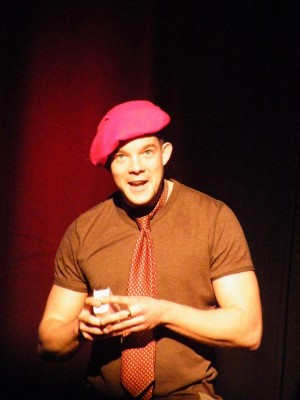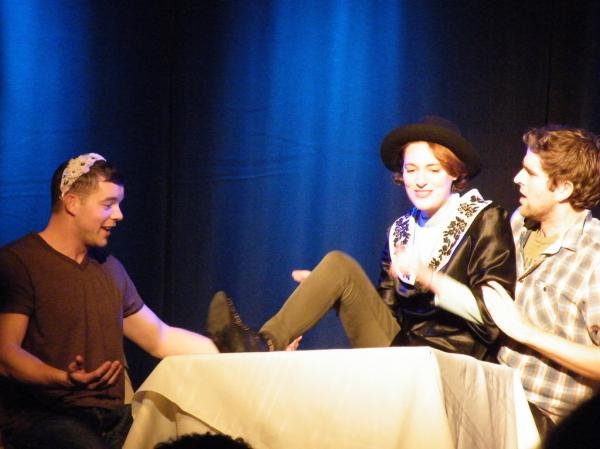You have no items in your cart. Want to get some nice things?
Go shopping
Photo (c) London Storytelling Festival.
Darkness, and a lit screen.
Hello, it reads. You must be the audience.
Somehow, that sounds like an order.
Soon, it goes on to tell us, you will hear the Voice. When the performers appear on the stage, they must listen to the Voice. They must obey the Voice. The Voice is God.
The primary performers—Thom Tuck, Russell Tovey, Humphrey Ker—are the test subjects in this literary experiment. They’re shoved onto the stage, dressed by an usher in a random assortment of slightly humiliating props, and assigned a first name by the Voice. Then the questioning begins:
How old are you? Where are you from? What’s in the bag?
Was that the real reason she left you?
What did Sister Judas do to you in that classroom?
She hit me! says Tovey, ad libbing frantically as Conway Conway Conway (named for, er, my father, my uncle and my gran), a thirteen-year-old Irish lad from Bottle, Cork.
The Voice does not like that answer, and expresses her disapproval with a sharp bell-ringing noise.
She farted on me! Ring.
She bit my arm? Ring.
She licked my arm. Ring.
She KISSED ME RIGHT ON THE LIPS.
I’ll accept that, says the Voice, and the story carries on.
That’s the genius of The Voices in Your Head, a show I went to watch last Sunday evening at the Leicester Square Theatre as part of this year’s London Storytelling Festival. Consciously bizarre and often sailing very close to the wind, it tells stories that are being made up as you watch—the result of a collaboration between actor and creator that often seems more like a conflict. In their quest to make up a character, and from that character create an interesting story, the Voice and the performers constantly try to trick each other, outface each other, and back each other into a narrative corner.

Since Tuck and Ker are stand-up comedians (both members of the historical sketch comedy troupe, the Penny Dreadfuls) and Tovey has a comic background, what come out of their mouths tend to be both lightning-quick and off-the-wall ridiculous. As the audience watches and laughs uproariously, they create characters: like Lily the dangerously unlucky New Orleans bride-to-be; Max, the rich and lonely owner of a Christmas ornament factory and vast amounts of gin; and Deirdre, the cadaver-robbing undertaker who owns a haunted skirt.
These characters and the stories that they have to tell are being built right in front of you, and watching this happen reaffirmed for me the weird power that narrative has on the human mind. The actors make backstory up on the fly in response to a battery of leading questions, and although we all know that what is coming out of their mouths is the thinnest, most random breed of nonsense, each detail, once spoken and approved by the Voice, takes on a funny kind of reality. However unlikely it might technically be (Deirdre’s skirt is haunted because she once shot a member of Pan’s People for it), these words temporarily become the truth. And what occurred to me, as I watched the madness unfold, is that this is quite a good metaphor for the creative process itself.
After all, how do authors make up their characters? They start with a blank space, they add in a stick figure, they give that figure a name and attributes, and then they begin to flesh out that person’s life until they’re fully realised enough to be put into a setting and started off on a particular trajectory. That’s what I do, at least, and that’s also a pretty perfect description of the idea behind this experiment in storytelling.
Just like the stories in The Voices in Your Head, when a character’s backstory does fall into place the details begin to appear not just right, but true. It seems like there’s no other way it can go; that’s just what’s happened to the character—even though you’ve just made up all those details in your head five minutes ago, before which they had had no reality at all. It’s a wonderfully exciting feeling, and it’s one of my favourite things about writing. Writers may seem self-effacing, but inside we’re all raging Frankensteins, messing about in our mental laboratories to come up with brand new human beings.
Many authors are often very anxious to reassure people that, although they spend their lives making up long and involved stories about completely non-existent people, they do not for a minute think that their characters are real. This is a lie to make writers sound less like the raving lunatics they are. The truth is that the process of creating and fleshing out characters often feels unnervingly like the struggle between the Voice and her actors. You are certain that a particular character should have one leg, two sisters and a goat. The character, however, keeps insisting on being a tiger-hunting pro skier. You create a tragic backstory about a child orphaned at a young age by a shock outbreak of diphtheria, but then the character’s father returns from his round-the-world tour with an escape artiste named Trisha. Does this make writers seem insane? Of course they are insane. They make up universes for a living.
Maybe that’s why I enjoyed The Voices in Your Head so much. There’s more than a whiff of insanity to the proceedings, but it’s the kind of insanity that’s so enjoyable to watch that it makes you want to be part of it. For me, that’s the lure of writing. It’s a crazy process and it looks like a crazy process, but at the same time it’s fascinating. Whether or not they intended it (and I suspect they did), The Voices in Your Head is the authorial impulse writ large. You begin with a name, you flesh out a character, and then you launch them into their environment, drop in other characters to interact with them, and before you know it, you’ve made a coherent story out of nothing. The results are unpredictable, but that’s the joy of creation. The joy of The Voice in Your Head was being allowed to watch that creation take place.

About Robin Stevens
Robin started out writing literary features for Litro and joined the team in November 2012. She is from Oxford by way of California, and she recently completed an English Literature MA at King's College, London. Her dissertation was on crime fiction, so she can now officially refer to herself as an expert in murder (she's not sure whether she should be proud of that). Robin reviews books for The Bookbag and on her own personal blog, redbreastedbird.blogspot.co.uk. She also writes children's novels. Luckily, she believes that you can never have too many books in your life.




